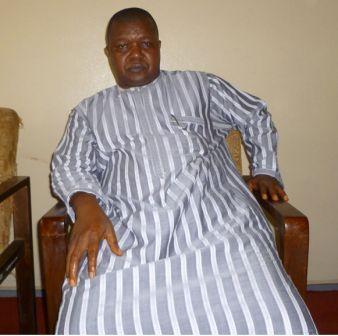The Unknown Facts about Lecturer Pay and the Minister of Education
The Ministry of Education has, on numerous occasions, come under attack from members of the public; particularly Teachers and Lecturers and sometimes students; all of whom are directly affected by whatever decisions the Ministry makes toward improving the educational standard of our country. (Photo: Dr. Minkailu Bah – Minister of Education, Science and Technology)
Currently, Lecturers in the two main universities – Fourah Bay and Njala, are on strike over demands for an increase in their salaries. This is not the first time this is happening and therefore one is always tempted to side with the Lecturers or Teachers if you don’t have the details. However, some of the attacks on the Ministry of Education and the Minister himself may have come out of an absence of clear and abundant information on what our educational system has been over the last four decades and how the Ministry of Education works and the fine line that it must walk when it comes to dealing with university administrations. Let me therefore attempt to share with members of the public some of the trouble our educational system has had to go through since we took over from our Colonial Masters.
The educational system in Sierra Leone has long had its challenges and roadblocks dating back to the period before our country attained its independence in 1961. By the time we took over governance of our nation in 1961, we had less than 15% of children aged 5-11 years attending school and only 5% of children between the ages of 12 to 16 years were attending school.
Our educational system did not undergo significant changes or reforms until 30 years later, which was the 1990s when we actually started adopting real reforms. These reforms were geared toward tailoring our educational system toward addressing our social and economic needs with a direct focus on increasing access to primary education as well as technical and/or vocational education.
It was not until 1993 that the country created the National Commission for Basic Education. Unfortunately, the civil war had its toll on all institutions of learning which resulted in 1,270 primary schools destroyed as a result. This reduced the number of primary schools in active operation and consequently reduced the number of Teachers in active service at the time. By the time the war ended in 2001, 67% of our school-going children were not attending school at all.
Although a lot of restructuring was undertaken by previous governments, by 2007 we still had over 240,000 who were ripe for school but not really attending school at all. This represented 25 to 30% of the total number of our school-age children at the time. Alarmingly, only 64% of our school-age children completed primary school during that period. Just looking at these figures and considering other mitigating factors, one would see why our educational system is still facing serious challenges. This cannot be blamed on any one political party. However, what is true and worthy of our consideration is that this present administration, under the leadership of Dr. Minkailu Bah as Minister of Education, has utilized funds from development partners in a much more judicious way to address our educational needs than any other government and Minister of Education in the past.
Let me now share with the public some of the improvements in the salaries and other benefits of lecturers across the country in the last 5 years. As reported in the “Awareness Times” Newspaper issue of Tuesday March 12, 2013 in a tabular form, when the APC government took over the administration of this country in 2007 with Dr. Minkailu Bah as Minister of Education, the total yearly subvention to Colleges and Universities across the country was Le27,526,107,339. It is important to also share with the public that “Subventions” mean total amount of money allocated to Colleges and Universities to help them run their institutions in a manner that will provide quality education for all students. This is completely different from monthly or annual salaries to lecturers and other support staff.
By the year 2008, the Ministry of Education increased the subventions by Two Billion Leones – so it rose to 29 Billion Leones. By 2009, the government and the Ministry of Education increased these subventions by 8 Billion Leones which brought the total yearly subventions to 37 Billion Leones. By 2010, the amount was again increased by 6 Billion Leones which brought the total to 43 Billion Leones. By 2011, the subventions were again increased by 6 Billion Leones for a total yearly subvention of 49 Billion Leones. This represented a hundred percent yearly increase on subventions from 2007 to 2011. Interestingly, by the following year, 2012, the government and its Ministry of Education, with the firm conviction to improve on our educational system, decided to increase the yearly subventions by 56 Billion Leones for a total of 105 Billion Leones. This represented the highest yearly percentage increase on subventions ever in the history of our national budget allocation to the Ministry of Education.
Now, I want to draw the attention of the public to the salaries of lecturers in the various colleges and universities across the country. The annual salary for professors at the Scale 1 Level 1 in January 2007 before the APC came to power was a mere Le21,507,525. This represented a monthly salary of Le1,792,294 for that professor. The highest paid professor within this category at the 10th level was receiving an annual salary of Le24,903,450. This represented a monthly salary of Le2,075,288. In a sense, the difference in monthly salary between the professor at the 10th Level, which is the highest level, and the professor at the 1st Level, which is the lowest level, was only Le282,994. Associate Professors; Senior Lecturers and Lecturers were receiving even lower.
Realizing the importance of keeping good Lecturers in our Colleges and Universities so that we can continue to improve on our educational standards, President Ernest Bai Koroma, in collaboration with the Minister of Education and other stakeholders, decided to increase the annual salaries of Lecturers by 50% in 2009; 20% in 2010; and 75% by January 2012. As a result, the Professor at the lower 1st level that was receiving a monthly salary of Le1,792,294 now receives Le5,645,725. The Professor at the 10th level, which is the highest level, who was receiving a monthly salary of Le2,075,288 in 2007, now receives Le6,532,156. Does this mean the Lecturers are receiving enough? I would say no; but the fact remains that since 2007, the Minister of Education, a Lecturer himself; with the support of his boss, the President of the nation, has been making efforts to increase the salaries of his colleagues at the Colleges and Universities across the country perhaps more than any other Minister of Education has done in over four decades.
The Minister understands that improving the education system of a country and the standard of living of those who are championing the cause of this improvement is an ongoing process that involves negotiations at every level.
The Minister also understands that the challenges to our educational system are still numerous but the approach toward tackling them is showing positive signs of improvement.
The government and its development partners will continue to focus on short, mid and long-term solutions to the education problems in this country. All stakeholders will be brought on board and the available resources will be utilized appropriately to lay a lasting foundation for continued growth and success in this sector of our socio-economic development.
The Minister would therefore like to prevail on all Teachers and Lecturers to exercise continued patience as he works tirelessly with his boss, the President, to bring sanity to our educational sector.
Brima Michael Turay, PRO – Ministry of Education, Science and Technology
Stay with Sierra Express Media, for your trusted place in news!
© 2013, https:. All rights reserved.






